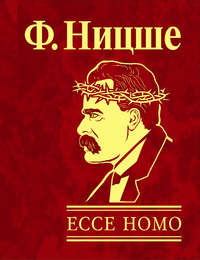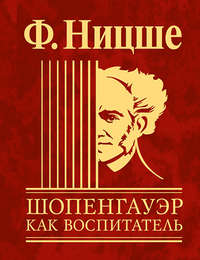 полная версия
полная версияHuman, All-Too-Human: A Book For Free Spirits; Part II
Envy and her Nobler Sister. – Where equality is really recognised and permanently established, we see the rise of that propensity that is generally considered immoral, and would scarcely be conceivable in a state of nature – envy. The envious man is susceptible to every sign of individual superiority to the common herd, and wishes to depress every one once more to the level – or raise himself to the superior plane. Hence arise two different modes of action, which Hesiod designated good and bad Eris. In the same way, in a condition of equality there arises indignation if A. is prosperous above and B. unfortunate beneath their deserts and equality. These latter, however, are emotions of nobler natures. They feel the want of justice and equity in things that are independent of the arbitrary choice of men – or, in other words, they desire the equality recognised by man to be recognised as well by Nature and chance. They are angry that men of equal merits should not have equal fortune.
30The Envy of the Gods. – “The envy of the Gods” arises when a despised person sets himself on an equality with his superior (like Ajax), or is made equal with him by the favour of fortune (like Niobe, the too favoured mother). In the social class system this envy demands that no one shall have merits above his station, that his prosperity shall be on a level with his position, and especially that his self-consciousness shall not outgrow the limits of his rank. Often the victorious general, or the pupil who achieves a masterpiece, has experienced “the envy of the gods.”
31Vanity as an Anti-Social Aftergrowth. – As men, for the sake of security, have made themselves equal in order to found communities, but as also this conception is imposed by a sort of constraint and is entirely opposed to the instincts of the individual, so, the more universal security is guaranteed, the more do new offshoots of the old instinct for predominance appear. Such offshoots appear in the setting-up of class distinctions, in the demand for professional dignities and privileges, and, generally speaking, in vanity (manners, dress, speech, and so forth). So soon as danger to the community is apparent, the majority, who were unable to assert their preponderance in a time of universal peace, once more bring about the condition of equality, and for the time being the absurd privileges and vanities disappear. If the community, however, collapses utterly and anarchy reigns supreme, there arises the state of nature: an absolutely ruthless inequality as recounted by Thucydides in the case of Corcyra. Neither a natural justice nor a natural injustice exists.
32Equity. – Equity is a development of justice, and arises among such as do not come into conflict with the communal equality. This more subtle recognition of the principle of equilibrium is applied to cases where nothing is prescribed by law. Equity looks forwards and backwards, its maxim being, “Do unto others as you would that they should do unto you.” Aequum means: “This principle is conformable to our equality; it tones down even our small differences to an appearance of equality, and expects us to be indulgent in cases where we are not compelled to pardon.”
33Elements of Revenge. – The word “revenge” is spoken so quickly that it almost seems as if it could not contain more than one conceptual and emotional root. Hence we are still at pains to find this root. Our economists, in the same way, have never wearied of scenting a similar unity in the word “value,” and of hunting after the primitive root idea of value. As if all words were not pockets, into which this or that or several things have been stuffed at once! So “revenge” is now one thing, now another, and sometimes more composite. Let us first distinguish that defensive counter-blow, which we strike, almost unconsciously, even at inanimate objects (such as machinery in motion) that have hurt us. The notion is to set a check to the object that has hurt us, by bringing the machine to a stop. Sometimes the force of this counter-blow, in order to attain its object, will have to be strong enough to shatter the machine. If the machine be too strong to be disorganised by one man, the latter will all the same strike the most violent blow he can – as a sort of last attempt. We behave similarly towards persons who hurt us, at the immediate sensation of the hurt. If we like to call this an act of revenge, well and good: but we must remember that here self-preservation alone has set its cog-wheels of reason in motion, and that after all we do not think of the doer of the injury but only of ourselves. We act without any idea of doing injury in return, only with a view to getting away safe and sound. – It needs time to pass in thought from oneself to one's adversary and ask oneself at what point he is most vulnerable. This is done in the second variety of revenge, the preliminary idea of which is to consider the vulnerability and susceptibility of the other. The intention then is to give pain. On the other hand, the idea of securing himself against further injury is in this case so entirely outside the avenger's horizon, that he almost regularly brings about his own further injury and often foresees it in cold blood. If in the first sort of revenge it was the fear of a second blow that made the counter-blow as strong as possible, in this case there is an almost complete indifference to what one's adversary will do: the strength of the counter-blow is only determined by what he has already done to us. Then what has he done? What profit is it to us if he is now suffering, after we have suffered through him? This is a case of readjustment, whereas the first act of revenge only serves the purpose of self-preservation. It may be that through our adversary we have lost property, rank, friends, children – these losses are not recovered by revenge, the readjustment only concerns a subsidiary loss which is added to all the other losses. The revenge of readjustment does not preserve one from further injury, it does not make good the injury already suffered – except in one case. If our honour has suffered through our adversary, revenge can restore it. But in any case honour has suffered an injury if intentional harm has been done us, because our adversary proved thereby that he was not afraid of us. By revenge we prove that we are not afraid of him either, and herein lies the settlement, the readjustment. (The intention of showing their complete lack of fear goes so far in some people that the dangers of revenge – loss of health or life or other losses – are in their eyes an indispensable condition of every vengeful act. Hence they practise the duel, although the law also offers them aid in obtaining satisfaction for what they have suffered. They are not satisfied with a safe means of recovering their honour, because this would not prove their fearlessness.) – In the first-named variety of revenge it is just fear that strikes the counter-blow; in the second case it is the absence of fear, which, as has been said, wishes to manifest itself in the counter-blow. – Thus nothing appears more different than the motives of the two courses of action which are designated by the one word “revenge.” Yet it often happens that the avenger is not precisely certain as to what really prompted his deed: perhaps he struck the counterblow from fear and the instinct of self-preservation, but in the background, when he has time to reflect upon the standpoint of wounded honour, he imagines that he has avenged himself for the sake of his honour – this motive is in any case more reputable than the other. An essential point is whether he sees his honour injured in the eyes of others (the world) or only in the eyes of his offenders: in the latter case he will prefer secret, in the former open revenge. Accordingly, as he enters strongly or feebly into the soul of the doer and the spectator, his revenge will be more bitter or more tame. If he is entirely lacking in this sort of imagination, he will not think at all of revenge, as the feeling of “honour” is not present in him, and accordingly cannot be wounded. In the same way, he will not think of revenge if he despises the offender and the spectator; because as objects of his contempt they cannot give him honour, and accordingly cannot rob him of honour. Finally, he will forego revenge in the not uncommon case of his loving the offender. It is true that he then suffers loss of honour in the other's eyes, and will perhaps become less worthy of having his love returned. But even to renounce all requital of love is a sacrifice that love is ready to make when its only object is to avoid hurting the beloved object: this would mean hurting oneself more than one is hurt by the sacrifice. – Accordingly, every one will avenge himself, unless he be bereft of honour or inspired by contempt or by love for the offender. Even if he turns to the law-courts, he desires revenge as a private individual; but also, as a thoughtful, prudent man of society, he desires the revenge of society upon one who does not respect it. Thus by legal punishment private honour as well as that of society is restored – that is to say, punishment is revenge. Punishment undoubtedly contains the first-mentioned element of revenge, in as far as by its means society helps to preserve itself, and strikes a counter-blow in self-defence. Punishment desires to prevent further injury, to scare other offenders. In this way the two elements of revenge, different as they are, are united in punishment, and this may perhaps tend most of all to maintain the above-mentioned confusion of ideas, thanks to which the individual avenger generally does not know what he really wants.
34The Virtues that Damage Us. – As members of communities we think we have no right to exercise certain virtues which afford us great honour and some pleasure as private individuals (for example, indulgence and favour towards miscreants of all kinds) – in short, every mode of action whereby the advantage of society would suffer through our virtue. No bench of judges, face to face with its conscience, may permit itself to be gracious. This privilege is reserved for the king as an individual, and we are glad when he makes use of it, proving that we should like to be gracious individually, but not collectively. Society recognises only the virtues profitable to her, or at least not injurious to her – virtues like justice, which are exercised without loss, or, in fact, at compound interest. The virtues that damage us cannot have originated in society, because even now opposition to them arises in every small society that is in the making. Such virtues are therefore those of men of unequal standing, invented by the superior individuals; they are the virtues of rulers, and the idea underlying them is: “I am mighty enough to put up with an obvious loss; that is a proof of my power.” Thus they are virtues closely akin to pride.
35The Casuistry of Advantage. – There would be no moral casuistry if there were no casuistry of advantage. The most free and refined intelligence is often incapable of choosing between two alternatives in such a way that his choice necessarily involves the greater advantage. In such cases we choose because we must, and afterwards often feel a kind of emotional sea-sickness.
36Turning Hypocrite. – Every beggar turns hypocrite, like every one who makes his living out of indigence, be it personal or public. – The beggar does not feel want nearly so keenly as he must make others feel it, if he wishes to make a living by mendicancy.
37A Sort of Cult of the Passions. – You hypochondriacs, you philosophic blind-worms talk of the formidable nature of human passions, in order to inveigh against the dreadsomeness of the whole world-structure. As if the passions were always and everywhere formidable! As if this sort of terror must always exist in the world! – Through a carelessness in small matters, through a deficiency in observation of self and of the rising generation, you have yourselves allowed your passions to develop into such unruly monsters that you are frightened now at the mere mention of the word “passion”! It rests with you and it rests with us to divest the passions of their formidable features and so to dam them that they do not become devastating floods. – We must not exalt our errors into eternal fatalities. Rather shall we honestly endeavour to convert all the passions of humanity into sources of joy.18
38The Sting of Conscience. – The sting of conscience, like the gnawing of a dog at a stone, is mere foolishness.
39Origin of Rights. – Rights may be traced to traditions, traditions to momentary agreements. At some time or other men were mutually content with the consequences of making an agreement, and, again, too indolent formally to renew it. Thus they went on living as if it had constantly been renewed, and gradually, when oblivion cast its veil over the origin, they thought they possessed a sacred, unalterable foundation on which every generation would be compelled to build. Tradition was now a constraint, even if it no more involved the profit originally derived from making the agreement. – Here the weak have always found their strong fortress. They are inclined to immortalise the momentary agreement, the single act of favour shown towards them.
40The Significance of Oblivion in Moral Sentiment. – The same actions that in primitive society first aimed at the common advantage were later on performed from other motives: from fear or reverence of those who demanded and recommended them; or from habit, because men had seen them done about them from childhood upwards; or from kindness, because the practising of them caused delight and approving looks on all sides; or from vanity, because they were praised. Such actions, in which the fundamental motive, that of utility, has been forgotten, are then called moral; not, indeed, because they are done from those other motives, but because they are not done with a conscious purpose of utility. – Whence the hatred of utility that suddenly manifests itself here, and by which all praiseworthy actions formally exclude all actions for the sake of utility? – Clearly society, the rallying-point of all morality and of all maxims in praise of moral action, has had to battle too long and too fiercely with the selfishness and obstinacy of the individual not to rate every motive morally higher than utility. Hence it looks as if morals had not sprung from utility, whereas in fact morals are originally the public utility, which had great difficulty in prevailing over the interests of the unit and securing a loftier reputation.
41The Heirs to the Wealth of Morality. – Even in the domain of morals there is an inherited wealth, which is owned by the gentle, the good-tempered, the compassionate, the indulgent. They have inherited from their forefathers their gentle mode of action, but not common sense (the source of that mode of action). The pleasant thing about this wealth is that one must always bestow and communicate a portion of it, if its presence is to be felt at all. Thus this wealth unconsciously aims at bridging the gulf between the morally rich and the morally poor, and, what is its best and most remarkable feature, not for the sake of a future mean between rich and poor, but for the sake of a universal prosperity and superfluity. – Such may be the prevailing view of inherited moral wealth, but it seems to me that this view is maintained more in majorem gloriam of morality than in honour of truth. Experience at least establishes a maxim which must serve, if not as a refutation, at any rate as an important check upon that generalisation. Without the most exquisite intelligence, says experience, without the most refined capacity for choice and a strong propensity to observe the mean, the morally rich will become spendthrifts of morality. For by abandoning themselves without restraint to their compassionate, gentle, conciliatory, harmonising instincts, they make all about them more careless, more covetous, and more sentimental. The children of these highly moral spendthrifts easily and (sad to relate) at best become pleasant but futile wasters.
42The Judge and Extenuating Circumstances. – “One should behave as a man of honour even towards the devil and pay his debts,” said an old soldier, when the story of Faust had been related to him in rather fuller detail. “Hell is the right place for Faust!” “You are terrible, you men!” cried his wife; “how can that be? After all, his only fault was having no ink in his ink-stand! It is indeed a sin to write with blood, but surely for that such a handsome man ought not to burn in Hell-fire?”
43Problem of the Duty of Truth. – Duty is an imperious sentiment that forces us to action. We call it good, and consider it outside the pale of discussion. The origin, limits, and justification of duty we will not debate or allow to be debated. But the thinker considers everything an evolution and every evolution a subject for discussion, and is accordingly without duty so long as he is merely a thinker. As such, he would not recognise the duty of seeing and speaking the truth; he would not feel the sentiment at all. He asks, whence comes it and whither will it go? But even this questioning appears to him questionable. Surely, however, the consequence would be that the thinker's machinery would no longer work properly if he could really feel himself unencumbered by duty in the search for knowledge? It would appear, then, that for fuel the same element is necessary as must be investigated by means of the machine. – Perhaps the formula will be: granted there were a duty of recognising truth, what is then the truth in regard to every other kind of duty? – But is not a hypothetical sense of duty a contradiction in terms?
44Grades of Morals. – Morality is primarily a means of preserving the community and saving it from destruction. Next it is a means of maintaining the community on a certain plane and in a certain degree of benevolence. Its motives are fear and hope, and these in a more coarse, rough, and powerful form, the more the propensity towards the perverse, one-sided, and personal still persists. The most terrible means of intimidation must be brought into play so long as milder forms have no effect and that twofold species of preservation cannot be attained. (The strongest intimidation, by the way, is the invention of a hereafter with a hell everlasting.) For this purpose we must have racks and torturers of the soul. Further grades of morality, and accordingly means to the end referred to, are the commandments of a God (as in the Mosaic law). Still further and higher are the commandments of an absolute sense of duty with a “Thou shalt” – all rather roughly hewn yet broad steps, because on the finer, narrower steps men cannot yet set their feet. Then comes a morality of inclination, of taste, finally of insight – which is beyond all the illusory motives of morality, but has convinced itself that humanity for long periods could be allowed no other.
45The Morality of Pity in the Mouths of The Intemperate. – All those who are not sufficiently masters of themselves and do not know morality as a self-control and self-conquest continuously exercised in things great and small, unconsciously come to glorify the good, compassionate, benevolent impulses of that instinctive morality which has no head, but seems merely to consist of a heart and helpful hands. It is to their interest even to cast suspicion upon a morality of reason and to set up the other as the sole morality.
46Sewers of the Soul. – Even the soul must have its definite sewers, through which it can allow its filth to flow off: for this purpose it may use persons, relations, social classes, its native country, or the world, or finally – for the wholly arrogant (I mean our modern “pessimists”) —le bon Dieu.
47A Kind of Rest and Contemplation. – Beware lest your rest and contemplation resemble that of a dog before a butcher's stall, prevented by fear from advancing and by greed from retiring, and opening its eyes wide as though they were mouths.
48Prohibitions without Reasons. – A prohibition, the reason of which we do not understand or admit, is almost a command, not only for the stiff-necked but for the thirster after knowledge. We at once make an experiment in order to learn why the prohibition was made. Moral prohibitions, like those of the Decalogue, are only suited to ages when reason lies vanquished. Nowadays a prohibition like “Thou shalt not kill,” “Thou shalt not commit adultery,” laid down without reasons, would have an injurious rather than a beneficial effect.
49Character Portrait. – What sort of a man is it that can say of himself: “I despise very easily, but never hate. I at once find out in every man something which can be honoured and for which I honour him: the so-called amiable qualities attract me but little”?
50Pity and Contempt. – The expression of pity is regarded as a sign of contempt, because one has clearly ceased to be an object of fear as soon as one becomes an object of pity. One has sunk below the level of the equilibrium. For this equilibrium does not satisfy human vanity, which is only satisfied by the feeling that one is imposing respect and awe. Hence it is difficult to explain why pity is so highly prized, just as we need to explain why the unselfish man, who is originally despised or feared as being artful, is praised.
51The Capacity of Being Small. – We must be as near to flowers, grasses, and butterflies as a child, that is, not much bigger than they. We adults have grown up beyond them and have to stoop to them. I think the grasses hate us when we confess our love for them. – He who would have a share in all good things must understand at times how to be small.
52The Sum-Total of Conscience. – The sum-total of our conscience is all that has regularly been demanded of us, without reason, in the days of our childhood, by people whom we respected or feared. From conscience comes that feeling of obligation (“This I must do, this omit”) which does not ask, Why must I? – In all cases where a thing is done with “because” and “why,” man acts without conscience, but not necessarily on that account against conscience. – The belief in authority is the source of conscience; which is therefore not the voice of God in the heart of man, but the voice of some men in man.
53Conquest of the Passions. – The man who has overcome his passions has entered into possession of the most fruitful soil, like the colonist who has become lord over bogs and forests. To sow the seed of spiritual good works on the soil of the vanquished passions is the next and most urgent task. The conquest itself is a means, not an end: if it be not so regarded, all kind of weeds and devil's crop quickly spring up upon the fertile soil that has been cleared, and soon the growth is all wilder and more luxuriant than before.
54Skill in Service. – All so-called practical men have skill in service, whether it be serving others or themselves; this is what makes them practical. Robinson owned a servant even better than Friday – his name was Crusoe.
55Danger in Speech to Intellectual Freedom. – Every word is a preconceived judgment.
56Intellect and Boredom. – The proverb, “The Hungarian is far too lazy to feel bored,” gives food for thought. Only the highest and most active animals are capable of being bored. – The boredom of God on the seventh day of Creation would be a subject for a great poet.
57Intercourse with Animals. – The origin of our morality may still be observed in our relations with animals. Where advantage or the reverse do not come into play, we have a feeling of complete irresponsibility. For example, we kill or wound insects or let them live, and as a rule think no more about it. We are so clumsy that even our gracious acts towards flowers and small animals are almost always murderous: this does not in the least detract from our pleasure in them. – To-day is the festival of the small animals, the most sultry day of the year. There is a swarming and crawling around us, and we, without intention, but also without reflection, crush here and there a little fly or winged beetle. – If animals do us harm, we strive to annihilate them in every possible way. The means are often cruel enough, even without our really intending them to be so – it is the cruelty of thoughtlessness. If they are useful, we turn them to advantage, until a more refined wisdom teaches us that certain animals amply reward a different mode of treatment, that of tending and breeding. Here responsibility first arises. Torturing is avoided in the case of the domestic animal. One man is indignant if another is cruel to his cow, quite in accordance with the primitive communal morality, which sees the commonwealth in danger whenever an individual does wrong. He who perceives any transgression in the community fears indirect harm to himself. Thus we fear in this case for the quality of meat, agriculture, and means of communication if we see the domestic animals ill-treated. Moreover, he who is harsh to animals awakens a suspicion that he is also harsh to men who are weak, inferior, and incapable of revenge. He is held to be ignoble and deficient in the finer form of pride. Thus arises a foundation of moral judgments and sentiments, but the greatest contribution is made by superstition. Many animals incite men by glances, tones, and gestures to transfer themselves into them in imagination, and some religions teach us, under certain circumstances, to see in animals the dwelling-place of human and divine souls: whence they recommend a nobler caution or even a reverential awe in intercourse with animals. Even after the disappearance of this superstition the sentiments awakened by it continue to exercise their influence, to ripen and to blossom. – Christianity, as is well known, has shown itself in this respect a poor and retrograde religion.











